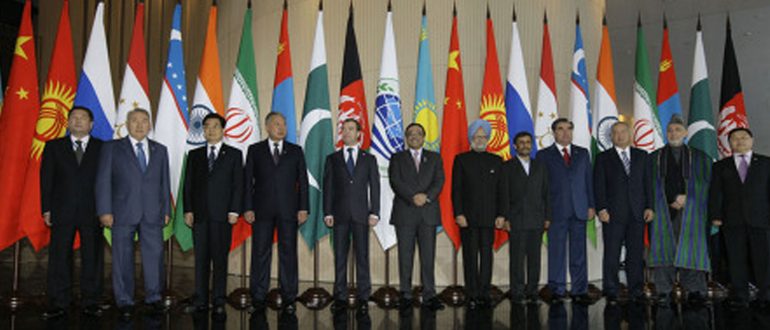
The new giant among regional organisations
On 24 June 2016, the day the EU started to implode, India and Pakistan joined the Shanghai Cooperation Organisation (SCO). The crossover between the events could indicate a geopolitical upheaval because after the South-East Asian states joined the SCO now represents 40% of the global population and is therefore the world’s largest regional organisation.
In addition to the major powers of China and Russia, the founding states include the Central Asian states of Uzbekistan, Kazakhstan, Kyrgyzstan and Tajikistan. The cooperation, which has been in place since 2001, is dedicated to security policy cooperation, economic and trading issues as well as the stability of the region. With the background of these various tasks, the question arises about which roles India and Pakistan want to take in the organisation and which national interests they are following.
Access and influence in Central Asia
As a result of their joint history, culture and religion, India and Pakistan have close links with Central Asia. On a bilateral level, this connectedness was always emphasised in order to exert the greatest possible influence in the region. Central Asia is important for India and Pakistan in two respects: energy policy and security policy.
In contrast to Central Asia, which has massive stocks of hydrocarbons, India and Pakistan are low-energy countries. Central Asia is therefore of key importance for securing Indian and Pakistani energy supplies. To clarify: Tajikistan generates enough energy to cover the whole of India’s needs.
One the key tasks of the SCO is fighting terrorism, radicalism and separatism in the region. Internal security in India and Pakistan mainly depends on political stability in Central Asia. In Delhi and Islamabad they therefore hope that – as part of the SCO – there will be closer cooperation when it comes to combating terror.
SCO membership will significantly facilitate overall access to Central Asia. The organisation offers a platform for stronger exchange with the Central Asian countries and enables greater influence to be taken in the region.
New Dynamism in the Central Asian Cooperation
The SCO will gain prestige and legitimation from the expansion. In particular, India’s membership will strengthen the economic components of the organisation. And in terms of security policy, they will benefit from the Indian and Pakistani expertise in dealing with terrorism and radicalism.
But it must be assumed that the tense political relationship between India and Pakistan will make closer cooperation within the organisation more difficult. A similar fate was experienced by the South Asian Association for Regional Cooperation (SAARC), which was paralysed for the most part by tension between India and Pakistan. The SCO framework however will enable India and Pakistan to find a joint language to overcome the conflict.
And the Afghanistan problem could be given a new dynamic by the inclusion of India and Pakistan because, from a long-term perspective, it is possible that the SCO could take on the stabilisation of Afghanistan after the withdrawal of US and NATO troops. Pakistan could take on a key role here. But the Indian military, which is after all the world’s third largest army, could then play a decisive role.
Apart from China and Russia, with India and Pakistan two other nuclear powers have joined the group. This wider platform enables broader cooperation in the non-dissemination of nuclear weapons and defusing nuclear armament. From an overall political perspective, the joining of the South Asian regional powers means that the SCO has come a good step closer to achieving its objective of establishing security and stability in the heart of Asia.
This article is part of IFAIR’s cooperation with the Diplomatic Magazine and was published in August’s issue under Ausgabe 09/2016.
